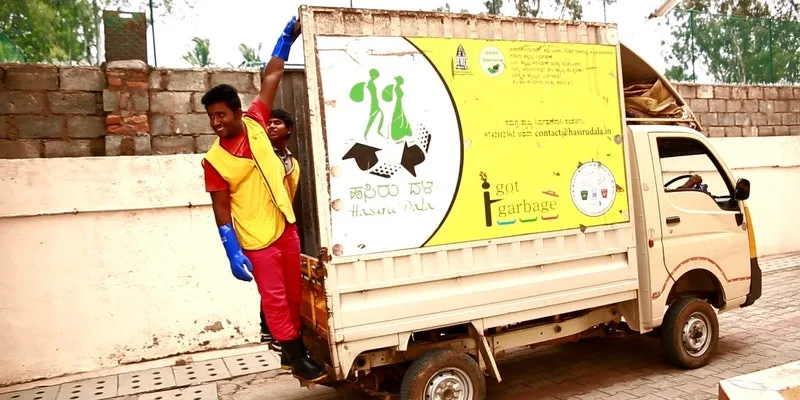How this waste management company addresses challenges in the sector by making entrepreneurs of waste pickers
By making the waste picker the heart of their model, Hasiru Dala Innovations successfully addresses several challenges of waste management.
Meet Lotfar, an employee of Bengaluru-based Hasiru Dala Innovations (HDI), who recently filed his IT returns.
“I moved from Delhi to Bengaluru 10 years ago, to make a living. I owned a small garbage business, and was struggling to make ends meet. About five years ago, on the recommendation of a friend, I joined Hasiru Dala. I was one of the first three workers in the company. In the beginning it was difficult as we had to build relationships and trust, but today processes are smooth because of that initial foundation,” says Lotfar.
Today, Lotfar owns two trucks, a scooter, has over 22 workers under him, and has created many similar predictable livelihoods in the waste management sector. Annama, another HDI employee, has educated both her daughters through high school and one of them is now going to college. She also built her own home and bought a truck with a bank loan. Most of HDI’s current 23 waste picker entrepreneurs filed their IT returns last year for the very first time in their lives.
“What convinced me to work with them was the sheer resilience they demonstrated day in and day out as they picked waste of value from the streets and dumps to earn their daily livelihood,” says Nalini Shekar, Co-founder of HDI. Co-founder Shekar Prabhakar adds, “The possibility of quantum change in their lives in our lifetimes is what motivates us every day as a team.”

Hasiru Dala Innovations’ all-women primary collection team is in charge of the collection, transport and management of waste segregated at source.
HDI is a for-benefit, not-for-loss social enterprise focused on creating better livelihoods for waste pickers, while offering bulk generators of waste (residential and non-residential) an end-to-end, responsible waste management solution with assured destinations for each waste stream.
How do they do this?
HDI’s model leverages the innate entrepreneurship of the waste picker. Shekar says, “HDI does not profit from recyclables collected as they believe recyclables are the property of the waste picker by right.”
The waste picker thus has two sources of income - a fixed monthly fee from the company with incentives for performance against Service Level Agreements, and the revenue from recyclables that is his to keep. HDI instead collects fees from the bulk generators, on the principle of “the polluter pays”, pricing it according to the amount of waste generated.
Today, HDI has over 430 clients (280 of whom are residential complexes covering over 30,500 households) who are responsibly managing the waste they generate, including three-way segregation at source, helping them to divert over 900 tons of waste per month away from landfills.
Shekar adds,
“And our client list is growing – we are adding five to 10 new clients every month, and finding commercial establishments from offices to schools and restaurants embracing responsible waste management.”
The model has also been replicated in Jamshedpur through JUSCO, a Tata company.
Also read: How this Mumbai-based duo's startup is solving waste management using tech
Solving bottlenecks

Trucks used by the waste pickers to collect segregated waste will eventually become their own asset at the end of four years.
By making the waste picker the heart of their model, HDI successfully addresses two challenges of waste management - higher levels of absenteeism because of the physically demanding and tough conditions of working with waste, and fleet maintenance.
The waste picker-entrepreneur is able to easily fill an absentee's position from within his neighbourhood, minimising disruptions in the service delivery. Further, as the truck will become his asset at the end of four years, he tends to look after it better than if it were company property.
Clients are assured of responsible management, because the company takes on the full responsibility of secondary transportation to destinations, relationship management with partner destinations, and reporting.
Finding success in waste management
HDI quickly learnt that while citizens have the enthusiasm and responsibility to dispose of waste systematically, they want a service that promises reliability, so that they don’t have to get involved with respect to time, effort, and mindshare. Realising that they had to operate like an essential utility service provider with high Quality of Service (QoS) levels, they installed a seven-day manned helpline.
Apart from empowering waste pickers, it is evident that success in this sector is dependent on an organisation's ability to engage with all stakeholders - the waste pickers, the citizens, the elected representatives, the urban local bodies (ULBs), bureaucrats and officials, policy makers at central, state and ULB levels, and those affected by disruption in status quo through HDI’s model.
Rama, CEO, ELCITA (Electronics City Industrial Township Authority) says, “Four years ago, there was no waste management facility at ELCITA. Today, almost 10 tons of waste is being processed by us, from hotels, private companies, and so on. We have benefitted from engaging with Hasiru Dala, which has demonstrated both technical and commercial strength over the past year.”
Hasiru Dala Innovations is one of the 10 startups participating in TheCityFix Labs accelerator program.
The authors are Monica Jain and Tanuka Mukherjee. Monica is part of Integrated Urban Planning programme, WRI India Ross Center, and supports TheCityFix Labs accelerator initiative. Tanuka (@TanukaMJ) is part of WRI India’s communications team.
Also read: Sanshodhan’s e-waste platform offers a guilt-free solution to get rid of old electronics sustainably






